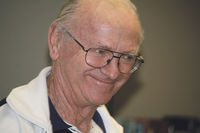Who presided at the Eucharist?
 Some activity in relation to the Eucharist is implied for the Twelve by the words of Jesus, ‘Do this in commemoration of me,’ but we are never told that any of them actually presided.
Some activity in relation to the Eucharist is implied for the Twelve by the words of Jesus, ‘Do this in commemoration of me,’ but we are never told that any of them actually presided.
The silence of the New Testament (NT) about who did preside by breaking the bread or saying the words means there is simply no compelling evidence for the classic thesis that the members of the Twelve always presided when they were present and that there was a chain of ordination passing the powers of presiding from the Twelve to missionary apostles or presbyter-bishops. The only thing we can be sure of is that someone did and those present acknowledged that right.
A more plausible substitute for the chain theory is the thesis that sacramental ‘powers’ were part of the mission of the church and that there were different ways in which communities designated individuals to exercise these powers. A small clue comes from Acts 13:1-2 where prophets ‘liturgise’ and the Didache 10:7 which permits prophets to give thanks (eucharistein) and celebrate the Eucharist on the Lord’s Day (14:1). The essential element was always community assent (tantamount to ordination whether or not that consent was signified by a special ceremony of laying on of hands).
A time of growth
With the growth of the church public consent had to be regularised, not only as to ordination but also to the type of person who could preside, leading to presiding becoming the exclusive privilege of bishops and presbyters. The Didache was written at the turning point for, while it permits wandering prophets to preside (10:7), there is instruction on celebrating Eucharist by appointing bishops and deacons who will render for the community the ministry (leiturgia) of the prophets. By the end of the first century two roles, once separate, have been joined, that of presbyter-bishop and that of celebrant of the Eucharist.
Besides caring for the doctrinal, moral and temporal needs of the flock, the bishop, with presbyters, is to care for the community sacramentally as well. In some churches at least, the bishop or designated presbyters have become the sole celebrants of the Eucharist. It is only when we get to 1 Clement (died 140 CE) that we get the picture of the ‘apostles’ appointing bishops who were in turn commissioned to appoint successors so that the one basic ministry is transmitted in lineal descent. By the end of the second century the blending of diverse NT roles has been completed and the full-blown concept of the Christian priest emerges. Dioceses grew larger with many parishes and clerical hierarchy was affected by civil models, especially in the feudal era.
A mixed blessing
The strength and idealism of the priesthood has been in its adaptation to and incorporation of the most prominent NT roles – the spiritual ideals of the disciples of Jesus, the dedicated service of Paul, the tried and true virtues of the presbyter-bishop, the dignity of the sacramental ministry associated with the bread of life and the cup of the new covenant. But in all of this is a weakness – it asks of one individual more than was asked of any one person who played a role in the NT. Ideals and functions in combination cloak the tension between the different character traits demanded by the various NT roles. This surely lies behind the identity crisis in priesthood today.
One priest will state that his task is to administer the sacraments and be a good pastor; another will contend that Christian ministry must be apostolic and reach out to the missionary needs of our day; another might affirm that above all a priest is to be a spiritual person with eyes fixed on the Lord. Each of these has backing in the NT. Often the proponent of one perspective fails to recognise that there is a basis in the NT for another view as well. There is legitimacy for a pluralism of priestly work and temperament, for different conceptions of priestly activity. The only identity crisis worthy of the name occurs when the priest forgets that it is Jesus Christ he bears witness to. With Paul the priest has to join him in issuing the challenge, ‘Become imitators of me as I am of Christ’ (1 Cor 11:1).
No one person, not even the most gifted leader, can carry out such a multiplicity of tasks. If ever there was a time for us to be ‘salt and light together’, to hear our Archbishop’s call to collaborative ministry, the message of Synod 2006, it is now, because the vibrancy and life of our faith community depends on the gifts of both the ordained and non-ordained, what we can do together.
References: R E Brown Priest and Bishop: Biblical Reflections.